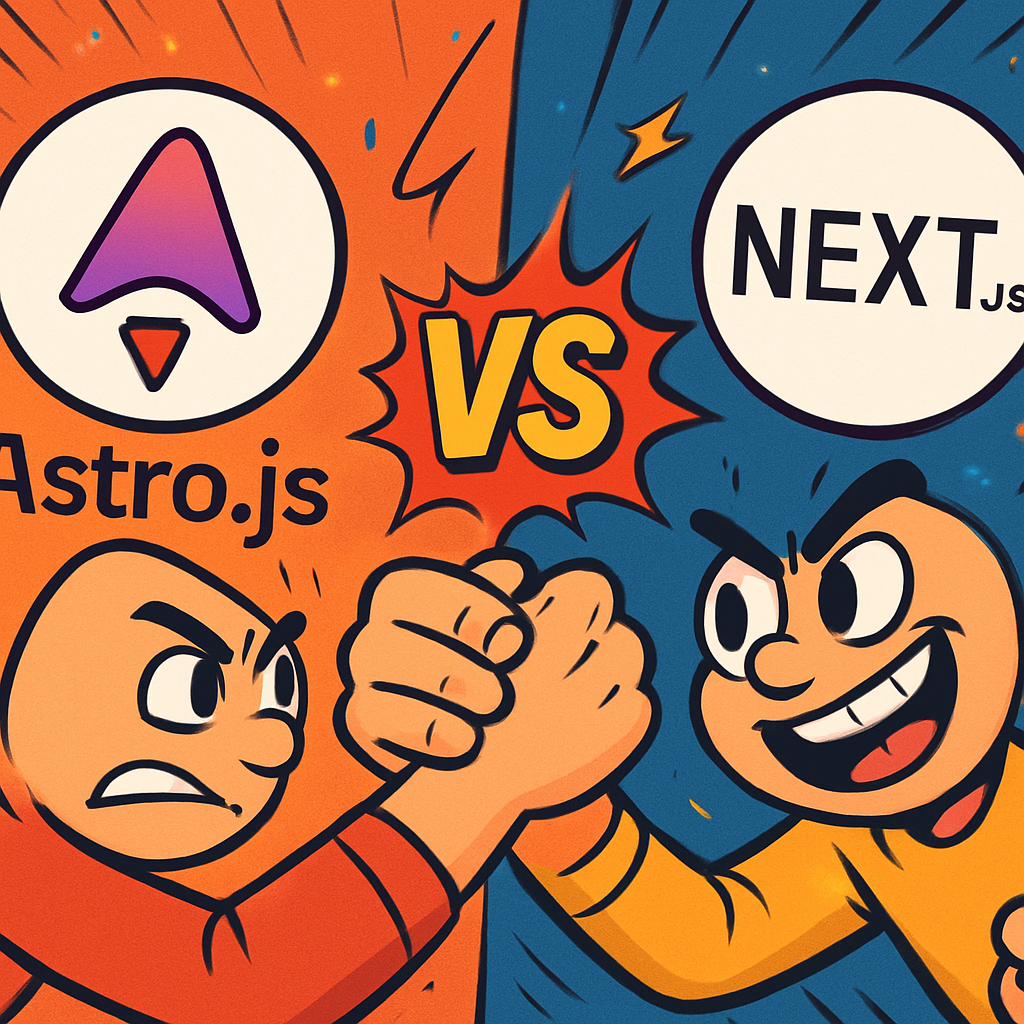
Astro vs Next.js: The Ultimate Showdown (2025 Edition)
A detailed comparison of Astro and Next.js for modern web development with examples.
Which is Better: Astro or Next.js?
“Astro is like a sports car that only drives when you need it to. Next.js is like a luxury SUV that can do everything but might be overkill for a quick trip to
“Astro is like a chef who only serves what you ordered. Next.js is the buffet. Both are delicious, but your stomach (and your Lighthouse score) will notice the difference.”
Welcome, web devs! Today, we’re pitting two of the hottest meta-frameworks against each other: Astro and Next.js. If you’re building a portfolio, blog, or even a SaaS, you’ve probably considered both. Let’s break down the hype, the real-world tradeoffs, and see some code in action—Fireship style.
TL;DR
- Astro: Ships zero JavaScript by default, islands architecture, best for content-heavy/static sites, super fast, easy to learn, but less mature ecosystem.
- Next.js: Full-stack React, SSR/SSG/ISR, huge ecosystem, great for apps, but can ship more JS than you want, and sometimes feels like configuring a spaceship to make a sandwich.
1. Rendering Models: Islands vs Everything
Astro uses islands architecture. Your static content is pure HTML, and only interactive components (React, Vue, Svelte, etc.) get hydrated as needed. This means:
- Blazing fast initial loads
- Minimal JS by default
- You choose what runs in the browser
Next.js is React-first. Everything is a React component, and you choose between SSR, SSG, ISR, or client-side rendering. This is powerful, but:
- More JS shipped by default
- Hydration everywhere
- Sometimes you just want a
<a>tag, not a React router
Example: Astro Island vs Next.js Component
---
import Counter from '../components/Counter.jsx';
---
<h2>Astro Example</h2>
<Counter client:load />Tip: If your component relies on browser APIs or needs to access the DOM, use Astro’s
client:onlyorclient:loaddirective. This ensures the code runs only after hydration on the client.
<Counter client:only />// Next.js
import { useState } from 'react';
export default function Counter() {
const [count, setCount] = useState(0);
return <button onClick={() => setCount(count + 1)}>Count: {count}</button>;
}2. Data Fetching & Routing
Astro: File-based routing, Markdown/MDX support out of the box, fetch data at build time (great for blogs/docs). No API routes (yet), but you can use endpoints or serverless functions.
Next.js: File-based routing, dynamic routes, API routes, middleware, and more. Fetch data at build, request, or on the client. Great for apps, dashboards, and anything dynamic.
Example: Blog Post in Astro vs Next.js
---
import { getCollection } from 'astro:content';
const posts = await getCollection('blog');
---
<ul>
{posts.map(post => <li>{post.data.title}</li>)}
</ul>// Next.js (getStaticProps)
export async function getStaticProps() {
const posts = await getPosts();
return { props: { posts } };
}3. Performance & Bundle Size
Astro: Ships only what you need. Static by default. Lighthouse scores that make recruiters weep with joy.
Next.js: Can be fast, but you need to work for it. Tree-shaking, code-splitting, and careful use of dynamic imports are your friends.
4. Ecosystem & DX
Astro: Young but growing fast. Integrates with React, Vue, Svelte, Solid, and more. Great docs. Some rough edges with advanced use cases.
Next.js: Mature, huge ecosystem, Vercel backing, tons of plugins, middleware, and community support. If you need something, it probably exists.
5. When to Use Which?
Use Astro if:
- You’re building a blog, marketing site, docs, or portfolio
- You want the fastest possible site with minimal JS
- You love Markdown/MDX
Use Next.js if:
- You’re building a dashboard, SaaS, or anything with lots of interactivity
- You need API routes, auth, or server-side logic
- You want React everywhere
Final Thoughts
Both Astro and Next.js are fantastic. Astro is the new kid with a killer static site game and a bright future. Next.js is the Swiss Army knife for React devs. Pick the one that fits your project, and don’t be afraid to mix and match. The web is big enough for both.
What do you think? Drop your hot takes below or try building your next side project with both!